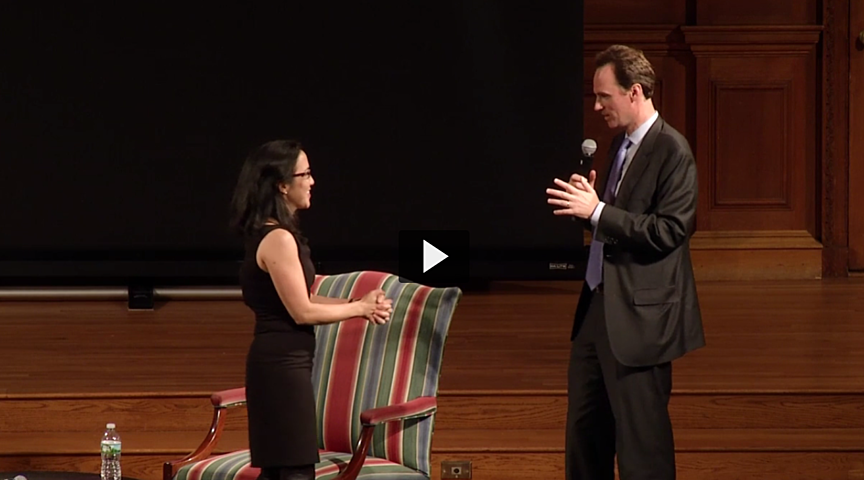
September 21, 2017
Angela Duckworth encourages character
Duckworth encourages motivation and creating the opportunity for practicing character are critical for young peopleby Jenny Corke
When John Palfrey, head of school at Phillips Academy Andover, joined the enthusiastic voices in the audience last Wednesday night to ask a question of Angela Duckworth, PhD, he acknowledged the question he was about to pose was risky given the circumstances. He was speaking in front of approximately one thousand people—among them trustees, parents, students, and faculty—in Cochran Chapel and on livestream.
“I am going to tell you here, in essence, what my theory is on education, and ask you if you think it’s wrong,” he said with a smile. Duckworth, letting out a laugh, promised the audience that this portion of the event hadn’t been rehearsed, but that she was ready.

[footnote]
Stream Angela Duckworth's talk now and see the live Q&A.
“I believe that this school, in its 240th year, can not only be as good in the academic excellence sense as it’s ever been,” said Palfrey. “I actually believe it can be better, while at the same time encouraging our kids to be more well and more healthy than they have ever been. We can redefine what excellence means to be one that is, more than just in the GPA sense, also in the sense of inclusive, more diverse, more rich, more supportive, more loving … I actually think that not only do they go together, they also self-reinforce. And I believe, not being a scientist, that in fact your science might prove that.”
Duckworth, who Palfrey had introduced as “an academic rockstar,” is the founder and CEO of Character Lab, a professor at University of Pennsylvania, and the author of Grit: The Passion of Power and Perseverance. She had earlier explained that it is important for students to develop a life of the mind, but that a school can’t always know if that’s happening based upon GPA alone.
“I one hundred percent think you’re right,” she responded, saying her data shows that character strengths, like grit and empathy, tend to be positively correlated, demonstrating that character is not a zero sum game. In addition, other areas, including achievement, well being, and relationships, are also positively correlated with character strengths.
Roadmap of Character
Duckworth, well known for her research on grit and how it can predict success, says grit is part of the larger roadmap of “character.” She defines character as a “plural word” in three parts:
- Strengths of heart: give to and receive from others
- Strengths of mind: thinking, imagination, creativity, and intellectual humility
- Strengths of will: achieve your goals
Duckworth said encouraging “motivation,” providing “how strategies,” and creating opportunity for practicing character are critical for young people. She also said the human brain is designed to learn and grow, noting that her work relates to the growth mindset work of Stanford University psychologist Carol Dweck, who had visited PA in 2015.
“In our joint work,” said Duckworth, “Students with growth mindsets are more likely to be gritty.”

#WhatIsCharacter
“Thank you for coming here and speaking so directly to the culture of our school,” said Miriam Feldman ‘18, as she introduced a question and answer session with the audience, fed through #WhatIsCharacter in Twitter. “I think it’s really powerful to hear the questions that run through our head, when we have an assignment, articulated in such a clear way.”
Two questions emerged on the theme of how grit is measured, and Duckworth responded that a “grit measurement” is tricky. Those considering this type of measurement should begin by asking themselves why they are seeking to assess grit. From there, they might consider whether they should instead focus on helping teachers to figure out how to teach grit and asking them what they need to do so in an otherwise busy classroom.
Student moderator Amiri Tulloch ‘18 closed the session with a question on how grit and character can be nurtured in any school environment. In her response, Duckworth cited the concept of locus of control, which she said we all have internally and should work on when we can.
You have things you can’t change, you have things that you can. And that is the heart of character.
”Learn More
In addition to other resources and tools, Duckworth provides “grit interventions” free of charge online, supported by the Character Lab:
Participants in the event, whether in person or online, are encouraged to provide their feedback through a brief survey. Your responses are greatly appreciated. Stay tuned to the events calendar for other upcoming events.
This event was supported by the Marla Glanzer & Lawrence H. Curtis Family Fund.
